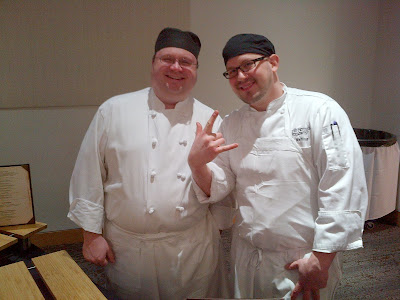SPARKY’S BLOG
1-28-14
Learning
to be a professional cook (5th in a series)
Aside from
cooking; a kitchen has to move properly in that it basically comes down to a
sum of moving parts. The people move, the
food moves, the methodology of cooking moves and when not managed properly;
well, you get the idea.
 |
| Another end to a great night of learning my craft |
I’m
fortunate to have been able to work in facilities that move well and learn from
instances when they don’t. I liken my
past history as a paint engineer to that of being a chef. In the engineering world I was tasked with saving money, improving
quality, making processes more efficient and expediting everything so the
result is produced nimbly and attractively.
This is pretty much the same thing a kitchen tries to assimilate to by
keeping an eye on food/labor costs, cooking to specified recipes or
temperatures, compartmentalizing dish assembly for speed and producing art on a
plate to induce a salivatory response by the customer.
One of the
first things I learned in both occupations is that you must, first, set up your
infrastructure for proper flow. If you
have an impedance or obstruction in your process then you won’t have a
symbiotic progression to finality of a dish.
I’m basically talking about time management because like they say “time
is money” and money rules all decisions for the most part.
 |
| Preparing an appetizer |
You have to
understand need in order to understand design.
A restaurant’s needs might see a long cooking line divided up into
sections like cold foods, fried foods, sautéed foods and/or entrée foods. This system is what the French call the “brigade
system” and it is infrastructure is how you decide flow and ease of movement. Something as simple as forgetting to set up a
cooking line with the right amount of plates, condiments, ramekins, gloves can
set a line back during service a great deal.
It won’t
happen all at once but a little at a time and if it isn't corrected straight
away then the term “in the weeds” becomes very prevalent as the kitchen will
fall behind and before you know it; bedlam is unleashed and a constant game of
catching up is introduced into the fray and this is completely
unacceptable.
 |
| Deep-frying shrimp! |
While
working at the Marriott we had check sheets and even more lists for set-up prior
to service. This pre-shift preparation
is paramount to success but even the most thought-out process can be improved
to include the nuts and bolts of an operation.
We also needed to understand that plates need to be put back in the
same place each and every time. I’ll
give you an example: when reaching for something that is always in the same
place; your brain and muscles will develop memory so it becomes second nature
and is introduced into your lexicon of movement when cooking on the line
speeding up efficiency.
So it makes
perfect sense to involve this “muscle memory” concept at every possible turn in
the process and that’s why restaurants and hotels have meetings before every
shift to discuss continuous improvement issues that arise during work shifts. A process without communication for a proper
path forward is a process doomed to failure.
At the Marriott we had daily shift meetings and we were encouraged to
participate as we would have a feeling of owning a piece of the process. Any time you’re engaged and fully ensconced
in the decision-making process is when a team becomes free of alloidial feeling
and produces amazing results.
 |
| Great food from a great hotel! |
Always
remember: put things back where they belong, always clean up your mess straight
away, set up your station the proper way with food AND dish wares, promptly
return/replace anything you borrow and communicate, communicate, communicate. My ongoing education in becoming a
professional cook has turned a crucial and fundamental page during my time at
the Marriott. I’m starting to wrap my
arms around processes combined with food preparation and cooking that will
enable me to trudge further down the culinary path to a dream of having my own
place some day. I say “trudge” because it’s
a long road without shortcuts and this will be my biggest lesson to learn thus
far.
Have a
great day and never give up!
Mark
(Sparky)
























